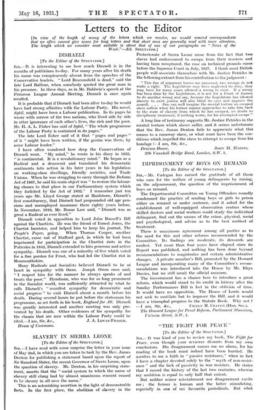SLAVERY IN SIERRA LEONE
[To the Editor of the SPECTATOR.]
Strt,—I have read with some surprise the letter in your issue of May 2nd, in which you are taken to task by the Rev. James Denton for publishing a statement based upon the report of Sir Ransford Slater, the recent Governor of Sierra Leone, upon the question of slavery. Mr. Denton, in his surprising state- ment, asserts that the " social system to which the name of slavery still clung had by almost unanimous consent ceased to be slavery in all save the name."
This is an astonishing assertion in the light of demonstrable facts. In the first place, the abolition of slavery in the Protectorate of Sierra Leone arose from the fact that two slaves had endeavoured to escape from their masters and having been recaptured, the case on technical grounds came before the Supreme Court in July, 1927. I think most British
people will associate themselves with Mr. Justice Petrides in the following extract from his contribution to the judgment :
" This line of argument leaves me unmoved, two wrongs do not make a right. The Legislature may have neglected its duty, they may have for many years allowed a wrong to exist. If a wrong has been done by the Legislature, it is not for a Court of Justice to do another wrong and say, because the Legislature has allowed slavery to exist justice will also blind its eyes and approve the assault. . . . One can well imagine the mental torture an escaped slave suffers when his former master approaches to take him back to the state of slavery from which he has escaped, no doubt to disciplinary treatment, if nothing worse, for his attempted escape."
A long line of testimony supports Mr. Justice Petrides in the mental torture which slaves suffer, and it seems unfortunate that the Rev. James Denton fails to appreciate what this means to a runaway slave, or what must have been the con- ditions which impelled the slave to attempt to escape from his bondage !—I am, Sir, &c.,


















































 Previous page
Previous page